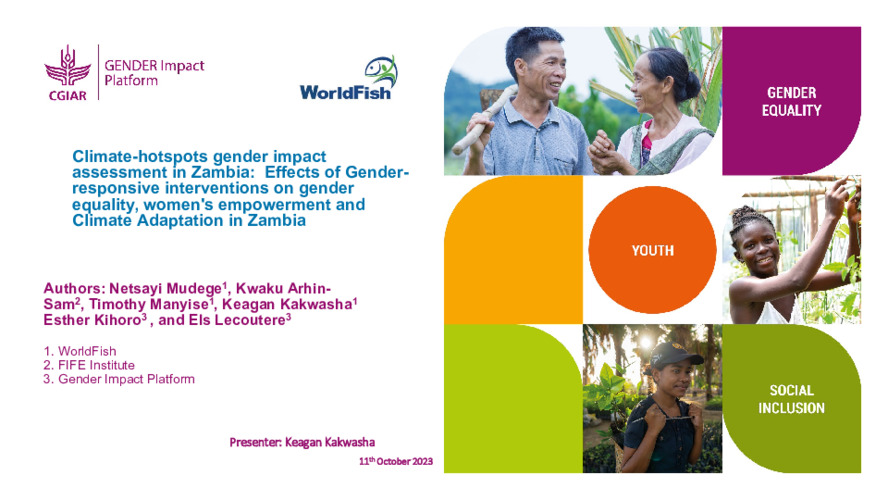Please use this identifier to cite or link to this item:
https://hdl.handle.net/20.500.12348/5830
Climate-hotspots gender impact assessment in Zambia: Effects of Gender-responsive interventions on gender equality, women's empowerment and Climate Adaptation in Zambia
| dc.creator | Mudege, N. | en_US |
| dc.creator | Kwaku, A. | en_US |
| dc.creator | Manyise, T. | en_US |
| dc.creator | Kakwasha, K. | en_US |
| dc.creator | Kihoro, E. | en_US |
| dc.creator | Lecoutere, E. | en_US |
| dc.date.accessioned | 2024-03-11T14:37:16Z | |
| dc.date.available | 2024-03-11T14:37:16Z | |
| dc.date.issued | 2023 | en_US |
| dc.identifier.citation | Netsayi Mudege, Arhin-Sam Kwaku, Timothy Manyise, Keagan Kakwasha, Esther Kihoro, Els Lecoutere. (11/10/2023). Climate-hotspots gender impact assessment in Zambia: Effects of Gender-responsive interventions on gender equality, women's empowerment and Climate Adaptation in Zambia. Bayan Lepas, Malaysia: WorldFish (WF). | en_US |
| dc.identifier.uri | https://hdl.handle.net/20.500.12348/5830 | |
| dc.description.abstract | The research objectives included assessing the effects of two aquaculture interventions on gender-equal access and control over resources, technology and information among smallholder farmers, evaluating the impact on climate resilience among smallholder fish farmers, and examining overall gender equality and women’s empowerment in aquaculture. The research employed a mixed-method design, combining quantitative surveys, qualitative interviews and discussions. Data was collected from 322 households (644 respondents) in treatment districts and 178 households (356 respondents) in control districts. Data analysis involved descriptive analysis, impact analysis using average treatment effect propensity score matching, and a women’s empowerment analysis using pro-WEAI. Women in treatment districts had a higher aggregate pro-WEAI score (0.88) than those in control districts (0.83), indicating greater empowerment among women in the treatment areas. The proportion of empowered women was higher (65%) in treatment districts compared to control districts (58%). The average empowerment gap between women and men within households suggested reduced disparity between women and men farmers in treatment districts. The main indicators contributing to disempowerment among women in the treatment district were access to credit and decision-making, work–life balance, and visiting important locations. The interventions enhanced women’s involvement in aquaculture; improved gender equality in access and control over resources, technology and information; promoted gender equality in climate-resilient practices; and enhanced women’s empowerment. However, there was limited evidence to support improved gender equality regarding benefits from the food system. | en_US |
| dc.format | en_US | |
| dc.language | en | en_US |
| dc.publisher | WorldFish (WF) | en_US |
| dc.rights | CC-BY-NC-4.0 | en_US |
| dc.title | Climate-hotspots gender impact assessment in Zambia: Effects of Gender-responsive interventions on gender equality, women's empowerment and Climate Adaptation in Zambia | en_US |
| dc.type | Presentation | en_US |
| cg.coverage.country | Zambia | en_US |
| cg.coverage.region | Eastern Africa | en_US |
| cg.subject.agrovoc | climate change | en_US |
| cg.subject.agrovoc | gender | en_US |
| cg.subject.agrovoc | research | en_US |
| cg.subject.agrovoc | gender equality | en_US |
| cg.subject.agrovoc | fish | en_US |
| cg.contributor.affiliation | WorldFish | en_US |
| cg.contributor.affiliation | CGIAR Gender Platform | en_US |
| cg.contributor.affiliation | The Friedensau Institute for Evaluation | en_US |
| cg.identifier.status | Open access | en_US |
| cg.contribution.worldfishauthor | Mudege, N. | en_US |
| cg.contribution.worldfishauthor | Manyise, T. | en_US |
| cg.contribution.worldfishauthor | Kakwasha, K. | en_US |
| cg.description.theme | Gender | en_US |
| cg.description.theme | Climate Change | en_US |
| cg.creator.id | Netsayi Mudege: 0000-0002-0389-1967 | en_US |
| cg.creator.id | Timothy Manyise: 0000-0003-1951-9892 | en_US |
| cg.creator.id | Keagan Kakwasha: 0000-0002-8646-9154 | en_US |
| cg.subject.sdg | SDG 5 - Gender equality | en_US |
| cg.subject.actionArea | Resilient Agrifood Systems | en_US |
| cg.subject.impactArea | Gender equality, youth and social inclusion | en_US |
| cg.contributor.initiative | Aquatic Foods | en_US |
Files in this item
This item appears in the following Collection(s)
-
Climate Change [204]
-
Gender [323]
